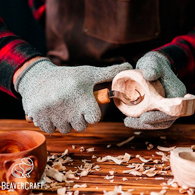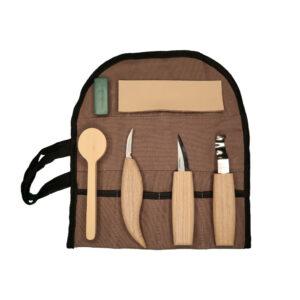In today’s fast-paced and often stressful world, finding healthy ways to relax and unwind is crucial for our overall well-being. Engaging in creative activities has been proven to be an effective method for stress relief, and wood carving is one such activity that offers both a creative outlet and a therapeutic experience. In this blog post, we will explore how wood carving can relieve stress and provide a range of benefits for individuals seeking a calming and fulfilling hobby.
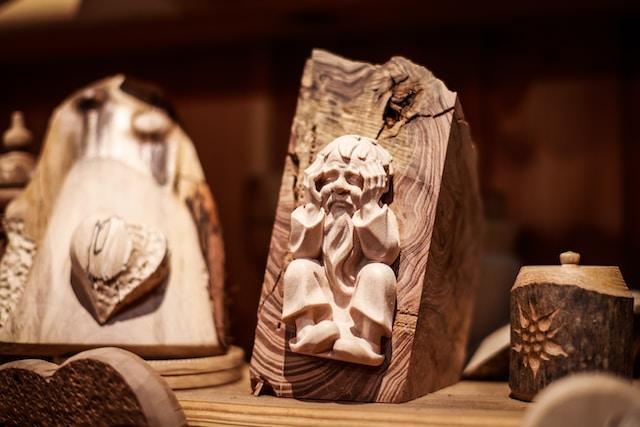
The Mind-Body Connection
- Understanding Stress: Stress is a natural response to challenging situations, but when experienced chronically, it can have detrimental effects on our mental and physical health. Finding activities that engage both the mind and body can help to counteract stress by redirecting our focus and promoting relaxation.
- Creative Expression: Wood carving involves the intricate process of shaping wood into beautiful and intricate designs. Engaging in creative expression through the art of carving allows individuals to tap into their artistic side and express their emotions and thoughts in a tangible and meaningful way.
- Mindfulness and Focus: Wood carving requires concentration and focus, which can help to calm an overactive mind and bring about a sense of mindfulness. By immersing oneself in the present moment and focusing on the details of the carving process, stress and worries can fade into the background, promoting a sense of inner peace and tranquility.
Therapeutic Benefits of Wood Carving
- Stress Reduction: Engaging in wood carving can help to alleviate stress by providing a creative and absorbing outlet for emotions. The rhythmic and repetitive movements involved in carving can induce a state of relaxation, allowing individuals to unwind and let go of tension.
- Emotional Release: Wood carving provides a safe and constructive way to release and process emotions. By channeling negative emotions into the carving process, individuals can find relief from stress, anger, or anxiety, transforming them into something beautiful and meaningful.
- Sense of Achievement: Wood carving is a skill that takes time and practice to master. Accomplishing a carving project, whether big or small, can instill a sense of achievement and boost self-confidence. This sense of accomplishment can counteract feelings of stress and promote a positive mindset.
- Flow State: Wood carving has the potential to induce a state of flow, where individuals become fully absorbed in the activity. In this state, time seems to pass effortlessly, and worries or stressors fade away. The immersive nature of wood carving allows individuals to experience a sense of harmony and deep engagement, contributing to stress reduction.
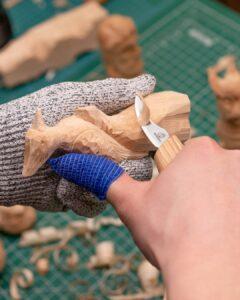 Mindfulness and Wood Carving
Mindfulness and Wood Carving
- Cultivating Mindfulness: Mindfulness is the practice of being fully present in the current moment without judgment. Wood carving can serve as a mindfulness practice, helping individuals cultivate a sense of mindfulness in their daily lives. By focusing on the carving process, individuals can develop a heightened sense of awareness and connect with the present moment.
- Stress Reduction: Mindfulness has been proven to reduce stress and anxiety by calming the mind and promoting a sense of relaxation. By incorporating mindfulness into wood carving, individuals can harness its stress-reducing benefits and find solace in the meditative aspects of the craft.
- Increased Self-Awareness: Engaging in wood carving mindfully allows individuals to develop a deeper understanding of themselves. Through observing their thoughts and emotions during the carving process, individuals can gain insights into their patterns of stress and learn to manage them more effectively.
Additional Benefits of Wood Carving
- Physical Engagement: Wood carving involves using hand tools and manipulating wood, which provides a physical engagement that can help relieve tension in the body and promote relaxation. The rhythmic motions of carving, such as carving strokes or sanding, can be soothing and provide a gentle form of exercise for the hands and arms. This physical engagement can help release built-up tension in the muscles, providing a sense of relief and promoting a sense of overall well-being.
- Mind-Body Coordination: Wood carving requires a delicate balance between precision and control. As individuals carve intricate designs into the wood, they develop and refine their hand-eye coordination and fine motor skills. This process of honing mind-body coordination can have a calming effect on the mind and create a sense of harmony between the body and the creative process.
- Cognitive Stimulation: Wood carving engages the mind in a variety of ways. From conceptualising designs to problem-solving during the carving process, individuals are challenged intellectually and stimulated cognitively. This mental stimulation can help divert attention from stressors and provide a sense of focus and clarity.
- Sense of Connection: Wood carving has a rich history and tradition that spans cultures and generations. Engaging in this craft can provide individuals with a sense of connection to the past and a greater appreciation for the art form. Additionally, joining carving communities or participating in carving workshops allows individuals to connect with like-minded individuals, fostering a sense of camaraderie and support.
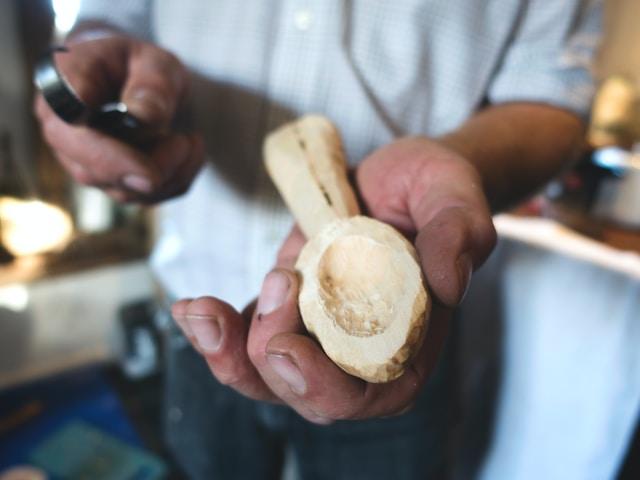
Getting Started with Wood Carving for Stress Relief
- Choose the Right Tools: To begin your wood carving journey, invest in quality carving tools suitable for your skill level. Start with a basic carving knife, gouges, and a comfortable carving mallet. As you progress, you can expand your tool collection to include specialised carving tools that cater to your specific interests and projects.
- Select Appropriate Wood: Choose the right type of wood for your carving project. Softwoods like basswood or pine are excellent choices for beginners as they are easier to carve and require less force. Hardwoods like oak or walnut offer more resistance and are suitable for advanced carvers looking for a challenge.
- Seek Learning Resources: Utilise books, online tutorials, or carving classes to enhance your skills and knowledge. Learning from experienced carvers can provide valuable insights, tips, and techniques that can help you progress in your carving journey.
- Practice Patience and Persistence: Wood carving is a skill that takes time to master. Be patient with yourself and embrace the learning process. Start with simple projects and gradually tackle more complex designs as your skills develop. Celebrate small achievements along the way, as each carving project completed is a testament to your progress.
- Carve in a Safe and Comfortable Environment: Ensure that you have a dedicated workspace that is well-lit, ventilated, and free from distractions. Follow safety guidelines when handling carving tools, such as wearing protective gloves and using carving benches or vices to secure the wood.
Knife Depot Three Piece Spoon Carving Set
$74.95 $52.95
Wood carving offers a unique and fulfilling way to relieve stress and promote well-being. Through its blend of creativity, mindfulness, physical engagement, and cognitive stimulation, wood carving provides a holistic experience that can help individuals find solace and balance in their lives. Whether you’re a beginner or an experienced carver, embracing wood carving as a stress-relieving hobby can bring a sense of joy, accomplishment, and tranquility. So pick up your carving tools, find a piece of wood, and let the transformative power of wood carving guide you towards a more relaxed and fulfilling life.




























